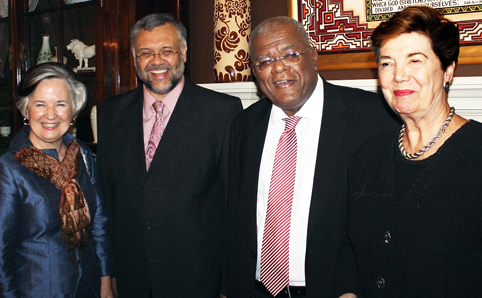 |
| At the dinner at the residence of the South African Ambassador to the USA, Mr Ebrahim Rasool, were, from the left: Prof. Debra Stewart, President of the Council of Graduate Schools in the USA; South African Ambassador, Mr Rasool; Prof. Jansen; and Prof. Molly Corbett Broad, President of the American Council on Education (ACE). |
The Ambassador for South Africa to the United States of America (USA), Mr Ebrahim Rasool, recently hosted Prof. Jonathan Jansen, Vice-Chancellor and Rector of our university and a group of representatives from major science councils, foundations and universities at his home in Washington DC. Our university is the first South African university to be hosted at the official home of the Ambassador.
“The University of the Free State has shown South Africa and the world how to work with the past and how to make the past work for them. “You are a thought leader who had the privilege not to be comfortable with your own ideas of history; you understood the need to change and embraced it. You have moved the fastest towards racial and human togetherness of all the South African universities,” Mr Rasool said.
Prof. Jansen responded by saying that Africa needed strong academic universities and that had to be the focus of tertiary institutions across the continent. “We must create opportunities for people to be together and to learn from each other. The UFS is an experiment of human togetherness – and this experiment is taking off,” he said.
During his visit to the USA, Prof. Jansen also discussed research partnerships and new placements for UFS staff and students through exchange visits.